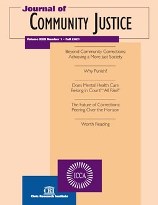Desistance: What We Can Learn From Recent Research
Author: Donald G. Evans.
Source: Volume 23, Number 02, Winter 2014 , pp.4-6(3)

next article > |return to table of contents
Abstract:
Early approaches to understanding why offenders cease their criminal activity pointed to the role of maturation and social and psychological factors as important aspects of that decision. However, there is still disagreement about the relative weight that each of these factors contributes to the desistance process. Research has continued as both researchers and practitioners seek to find ways to enhance and improve the pathways out of crime. In attempting to answer why practitioners should be following the progress of desistance research and practice, the author has relied on the information shared by the panelists at the First World Congress on Probation held in London in October 2013 as a starting point for future discussions.Keywords: Desistance from crime, maturation and desistance, First World Congress on Probation, stigmatization and labeling
Affiliations:
1: Journal Editor.